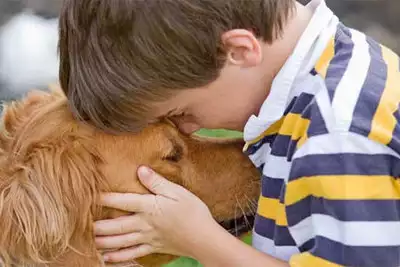The bond between humans and animals goes beyond mere companionship; it encompasses a myriad of roles and responsibilities that animals play in society. From providing emotional support and comfort as therapy animals to assisting individuals with disabilities as service animals, pets serve as invaluable allies in promoting health, well-being, and independence. In this blog, we’ll explore the diverse roles that pets play in society, the impact they have on individuals and communities, and the profound ways in which they enrich our lives.
Therapy Animals: Healing Hearts and Minds
Emotional Support and Comfort
Therapy animals, such as therapy dogs and cats, are trained to provide emotional support and comfort to people in need. Whether visiting patients in hospitals, comforting victims of trauma or natural disasters, or providing companionship to seniors in nursing homes, therapy animals have a remarkable ability to soothe, uplift, and bring joy to those they encounter.
Reducing Stress and Anxiety
Interacting with therapy animals has been shown to have numerous benefits for mental health and well-being. Studies have found that spending time with animals can reduce stress hormones, lower blood pressure, and alleviate symptoms of anxiety and depression. The unconditional love and non-judgmental acceptance offered by therapy animals create a safe and supportive environment for individuals to express themselves and process their emotions.
Promoting Social Interaction and Connection
Therapy animals also serve as catalysts for social interaction and connection, helping individuals overcome feelings of loneliness and isolation. Whether participating in animal-assisted therapy sessions or attending pet visitation programs, people of all ages and backgrounds have the opportunity to bond with animals and form meaningful relationships with others who share their love for animals.
Service Animals: Partners in Independence
Assistance with Daily Tasks
Service animals, such as guide dogs for the blind, hearing dogs for the deaf, and mobility assistance dogs for individuals with physical disabilities, are trained to perform specific tasks that help their handlers navigate the world with greater independence and confidence. These tasks may include guiding their handler safely through traffic, alerting them to sounds or alarms, retrieving dropped items, or providing stability and support while walking or standing.
Enhancing Quality of Life
For individuals with disabilities, service animals play a vital role in enhancing their quality of life and promoting their independence and autonomy. Service animals not only assist with practical tasks but also provide emotional support and companionship, helping their handlers overcome barriers and obstacles in their daily lives.
Legal Rights and Protections
Service animals are protected by laws such as the Americans with Disabilities Act (ADA), which grants individuals with disabilities the right to be accompanied by their service animals in public places and on public transportation. These laws ensure that individuals with disabilities have equal access to employment, education, housing, and public accommodations, regardless of their need for a service animal.
Beyond Therapy and Service: Pets as Companions and Comrades
Unconditional Love and Companionship
While therapy animals and service animals play important roles in society, the vast majority of pets serve as beloved companions and companions for their owners. Whether it’s the playful antics of a dog, the soothing purr of a cat, or the gentle presence of a small animal or bird, pets bring joy, laughter, and unconditional love into our lives.
Promoting Physical Activity and Well-being
Pets also encourage their owners to lead active, healthy lifestyles by providing motivation for daily exercise and outdoor activities. Whether it’s going for a walk, playing fetch in the backyard, or participating in agility or obedience training, pets keep their owners physically active and engaged, promoting cardiovascular health, strength, and overall well-being.
Reducing Feelings of Loneliness and Isolation
For people living alone or experiencing social isolation, pets provide much-needed companionship and emotional support. The presence of a pet can alleviate feelings of loneliness and depression, providing a source of comfort and connection in times of need. Pets offer unconditional love and acceptance, creating a sense of belonging and security for their owners.
Conclusion: Honoring the Bond Between Humans and Animals
In conclusion, the role of pets in society is multifaceted and profound, encompassing a wide range of functions and responsibilities that enrich our lives in countless ways. Whether they’re providing emotional support as therapy animals, assisting individuals with disabilities as service animals, or simply offering companionship and love as beloved pets, animals play an essential role in promoting health, well-being, and connection in our communities.
As we continue to explore the diverse roles that pets play in society, it’s clear that the bond between humans and animals is a source of joy, comfort, and inspiration that transcends species and boundaries. Whether we’re snuggling with a therapy dog, navigating the world with a service animal, or cuddling up with a beloved pet at home, the bond we share with animals is a testament to the power of love, compassion, and understanding that unites us all. By honoring and cherishing this bond, we honor the inherent value and dignity of all living beings, fostering a more compassionate and inclusive society for people and animals alike.






